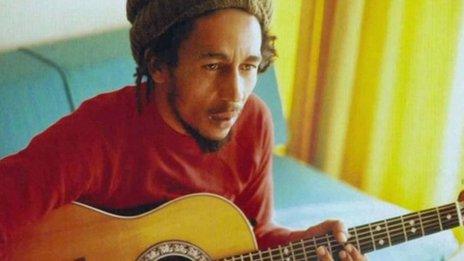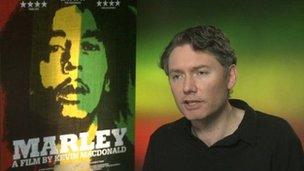Bob Marley and me: Kevin Macdonald on a 'third world superstar'
- Published

Bob Marley was described by Macdonald as the first "third world superstar"
Scottish film maker Kevin Macdonald may not appear to be the obvious choice to make the definitive biopic documentary on reggae music legend Bob Marley.
But Macdonald said it was amazing how people all over the world could identify with the Jamaican Rastafarian musician who died three decades ago, at the age of just 36.
"When I was growing up on Loch Lomondside, one of the first albums I ever bought was Marley's Uprising. I guess that would have been 1980 - just before he died.
"The amazing thing about it is that it is so accessible - his music - and yet it has got all this message, this sense of rebellion and edginess and anti-establishment feeling about it."

Kevin Macdonald said Marley had a "unique place" in music history
Macdonald, who won an Oscar for his documentary One Day in September about the murder of Israeli athletes at the 1972 Munich Olympics, said Marley had a "unique place" in music history, with an appeal which went far beyond his songs.
"He appeals in a way that is also political and spiritual," he told <link> <caption>BBC Radio Scotland's Janice Forsyth programme</caption> <url href="http://www.bbc.co.uk/programmes/b0079g47" platform="highweb"/> </link> .
"You go to Africa - as we did when making this film - and you'll meet people who think he is a prophet and live by his words.
"You go to India and it is the same thing.
"We even found young Tibetans, who want to be liberated from the yoke of China, and they play Marley."
Mixed race
Macdonald, whose feature films include Last King of Scotland, State of Play and The Eagle, said despite Marley becoming a global superstar, one of the problems was how little footage there was of him, especially in his early years.
He said: "For the first 10 years of his career, from 1962 to 1972, there is not a single piece of film.
"It is the key to understanding Marley. He comes from a third world country, a developing world country.
"He's the only third world superstar.
"So he comes from a place where people did not have stills cameras let alone movie cameras."
According to Macdonald, the first photo of Marley was from when he was 16.
It was taken with his mother and baby sister who were about to move to the US for work.
Marley had been brought up by his mother.
His father was a white Jamaican in his sixties who had a brief relationship with Marley's teenage mother.
"It is a salient thing I found out about Bob," Macdonald said.
"He always felt like an outsider because he was mixed race.
"In Jamaica in those days, if you were mixed race the black community did not accept you and the white community did not accept you.
"In a way Bob had to find an identity and he found that through the Rastafarian religion."
Moving testimony
The documentary makes up for a shortage of filmed interviews with Marley by speaking to the people who knew him best.
Macdonald said the family were "on board" because they felt the time was right to tell the story.
Marley, who married Rita in 1966, had children with about half a dozen different women.
Macdonald said Marley's eldest daughter Cedella, who was 14 when he died, gave a moving testimony in the film.
"She is still conflicted by admiring her father, loving her father but wanting more from him," he said.
"She felt like he let her down. He wasn't around enough. He was out womanising.
"She talks about how much her mum was hurt by the way he behaved, but he believed in free love."
Macdonald added: "The interesting thing is that the women we talked to who were his girlfriends at one time or another, they all feel angry towards him but they all forgive him. They are still in love with him in a way.
"The most moving element was showing the finished film to the 11 kids and they all reacted in the same way, which was tears and then saying to me 'I feel like I have got to know a side of my father I didn't know before'."